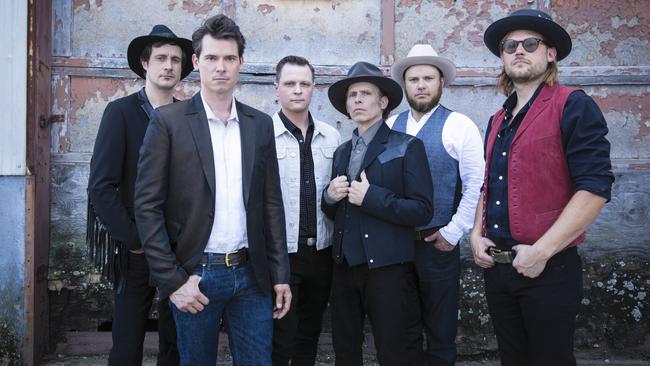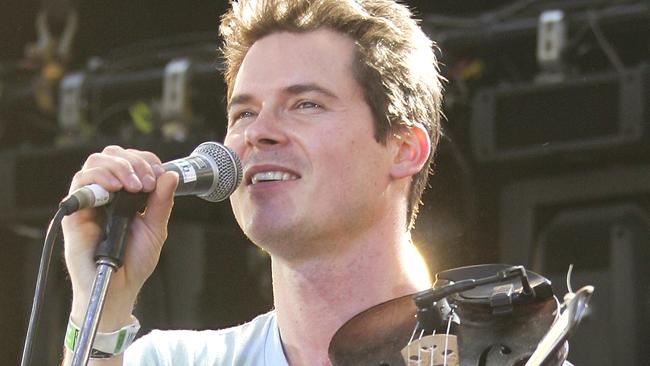Old Crow Medicine Show’s Blonde on Blonde tour in Australia
‘If you are a hardcore Bob Dylan fan you can see that we knew what we were doing,’ says Old Crow’s Ketch Secor.

Nothing is sacred in American music, according to Old Crow Medicine Show’s singer and fiddle player Ketch Secor. That would have to be the starting viewpoint, one would think, for anyone considering doing their own version of one of the most revered albums in history, Bob Dylan’s Blonde on Blonde.
“You just have to clean it, make it yours, feel it,” Secor says.
The musician and his colleagues in the acclaimed Nashville Americana band did exactly that last year, taking Dylan’s classic 1966 double album and reinventing it in their own image in front of a sellout crowd at Nashville’s CMA Theatre, part of the city’s Country Music Hall of Fame and Museum. The recording of that show became an album, 50 Years of Blonde on Blonde, in April this year, prompting a world tour, the tail-end of which sees Old Crow Medicine Show returning to Australia later this month to perform its interpretation of Dylan’s opus.
It’s a project very close to Secor’s heart. He has been a Dylan tragic for most of his life, so he knows the Nobel prize-winner’s music inside out. “I can’t imagine my life without him when I was aged 12 or even 10,” says Secor, who teamed up with Old Crow’s guitarist Critter Fuqua when they were in seventh grade in the town of Harrisonburg in Virginia.
“I absorbed that material all through my teen years,” he says. “A lot of teenagers didn’t, but they’ve got ’im now.”
By that Secor means that through Old Crow’s version of Blonde on Blonde, which remodels songs such as Just Like a Woman, Pledging My Time and Leopard-Skin Pill-Box Hat in a rootsy, acoustic setting, the band has been able introduce a younger demographic to Dylan’s music. “We’ve turned on a lot of youngsters to Bob Dylan,” he says.
“There are a lot of them who are Old Crow fans who have never really listened to him. They missed the boat on it. That’s so odd for me, because I grew up with him.”
The world is awash with Dylan purists, including in Australia, but so far Old Crow has not encountered any backlash against its bold take on his work. “I’m often aware of audience members that are those old Dylan fans who take notes through a Dylan show,” says Secor.
“We are such a newer generation that I think that they are just tickled by it. They can see all the Dylan brushstrokes that we put into making our version of the album. They see that our version of Just Like a Woman comes from The Concert for Bangladesh [as part of Dylan’s contribution to the two concerts hosted by George Harrison and Ravi Shankar at New York’s Madison Square Garden in 1971].
“You can tell, if you’re a hardcore Dylan fan, that it’s Bangladesh. There’s George Harrison’s guitar part on there.
“Because I’m such a hardcore Bob Dylan fan, if you are a hardcore Bob Dylan fan you can see that we knew what we were doing.”
The main difference between Dylan’s original album and the Old Crow treatment is that the latter is largely acoustic, since that is how the band has operated since its inception in 1998, playing a hotchpotch of old-time, bluegrass, country and jug band music on guitars, stand-up bass, fiddles, banjos, mandolins and assorted percussion.

As Secor says, “We are not an electric band. The only instrument that we have that has any sustain is the pedal steel. We’re not a band that can play dum da dum da dum da dum and make it sound very exciting.
“We’re not a blues rock band.”
Old Crow Medicine Show, which is made up of Secor, Fuqua, bassist Morgan Jahnig, guitjo (a guitar/banjo hybrid) player Kevin Hayes and multi-instrumentalists Chance McCoy and Cory Younts, started out as a busking outfit, playing on street corners and anywhere they could across upstate New York, Canada and North Carolina in the late 1990s and early noughties.
There are two pivotal moments in Old Crow’s career. The first was when they were discovered by country/folk legend Doc Watson, playing in the street in Boone, North Carolina. He put them on the bill of a festival he ran and the young band’s career took a step up from there. Then came the move to Nashville and more busking, including outside country music’s most celebrated venue, the Grand Ole Opry. During that early period Willie Watson, now an established solo artist who has toured Australia several times, was also in the ranks.
Secor says that at that time “we just expected to be hungry and then fed, sober and then drunk. We really had no expectations. It just felt like such a Greek odyssey, what the hero’s journey is supposed to be about. I felt so heroic in my ambition to conquer Nashville. That was the drive that I had. Not everybody has to have that drive, but I certainly did. We just kept working and it kept getting richer the longer we went.”
The other landmark turn of fortunes, strange as it is, also involves Dylan.
While still at school, Fuqua brought home a Dylan bootleg from a trip to London that contained a rare outtake called Rock Me Mama, from the recording session for Dylan’s soundtrack to the movie in which he starred, Pat Garrett and Billy the Kid (1973). Fuqua passed on the recording to Secor who, after listening to it incessantly for months, put some of his own words to the tune. That track, Wagon Wheel, which featured on an early EP and the band’s 2004 album O.C.M.S., became the group’s signature song, on which Secor and Dylan share the copyright.
“That’s been a really significant song for us,” Secor says. “It’s a song that is bigger than the band. It has opened a lot of doors for us and given us opportunities. I don’t think we would be members of the Grand Ole Opry in Nashville without Wagon Wheel. It’s kind of sacred, the star that we all hitched our wagons to.”
Since then Old Crow has become one of the most revered Americana outfits, with a string of No 1 albums in the US bluegrass and folk charts, such as Big Iron World (2006), Tennessee Pusher (2008), Carry Me Back (2012), Remedy (2014) and the new Dylan salute. The band has also been influential to a new generation of Americana musicians in the US and across the world.
“They tell me that we have (been an influence),” Secor says. “We have people come up to us and say they were inspired to pick up an instrument. I’m more interested in selling banjos than I am in selling records. What can you do with a record? You can listen to it. But what can you do with a banjo? You can live.”
Alongside their collective recording and touring there have been Old Crow collaborations with artists such as Gillian Welch and David Rawlings and Emmylou Harris. Rawlings produced the album O.C.M.S. (on which Welch played drums), while Secor is a guest on Rawlings’s recent album Poor David’s Almanac.
All those acts are Nashville-based, which suggests a strong sense of community within the Americana fraternity, but as Secor points out, it’s not as strong as the one that united the folk community during a strident period of change in the US in the 1960s.
“When I think about the great folk revival of the 1960s, what made it so powerful was its sense of purpose and a unified direction. It was placed right beside the civil rights movement and the anti-war movement. So in that sense it’s not as unified today as you might think because it doesn’t have that sense of purpose. We are not collectively working towards something. That’s a bit of a problem.
“Folk music has this purpose. I’d like to see it bring more people together, but not just because we’re all guitar players or we all write songs or we all like our professions, but because we’re going to figure out what to do about global migration patterns or we’re going to overthrow the president. I think there is more opportunity for us to work together.”
Secor is looking forward to extending the band’s sense of community to Australians on its upcoming visit. Old Crow will be here as cultural ambassadors from Tennessee. “We’re excited about sharing this thing that we do in Tennessee,” he says. “We have a lot in common with Australia. If Australia was an American state it would look a lot like Tennessee.”
And, given he’s such a Dylan aficionado, does he think Blonde on Blonde is His Bobness’s best LP? “I never would have thought that before I tried to learn it,” Secor says. “But now that I know it better than any other record — and I know all Bob’s records real well — I’m an expert on Bob and I do now believe after learning it verbatim and acting it out in the disembodied play, that it is … an absolute masterpiece.”
Old Crow Medicine Show performs Blonde on Blonde in Brisbane on Thursday, Melbourne on October 1 and Sydney on October 3.



To join the conversation, please log in. Don't have an account? Register
Join the conversation, you are commenting as Logout